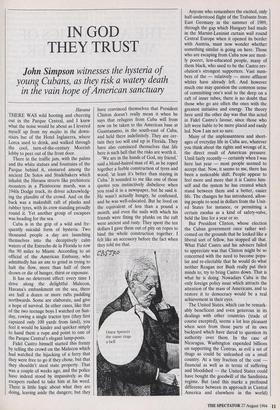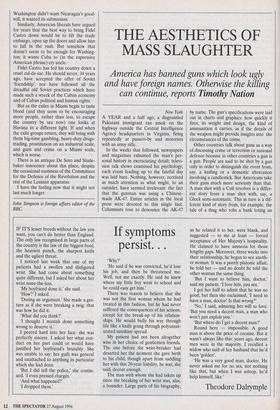IN GOD THEY TRUST
John Simpson witnesses the hysteria of
young Cubans, as they risk a watery death in the vain hope of American sanctuary
Havana THERE WAS wild hooting and cheering out in the Parque Central, and I knew what the noise would be about as I levered myself up from my mojito in the down- stairs bar of the Hotel Inglaterra, where Lorca used to drink, and walked through the cool, turn-of-the-century Moorish lobby to peer out of the front door.
There in the traffic jam, with the palms and the white statues and fountains of the Parque behind it, ensnared among the ancient De Sotos and Studebakers which inhabit the Havana streets like prehistoric monsters in a Pleistocene marsh, was a 1940s Dodge truck, its driver acknowledg- ing the plaudits of the crowd. And on the back was a makeshift raft of planks and rubber tyres, with its crew standing proudly round it. Yet another group of escapees was heading for the sea.
Cuba is in the grip of a wild and fre- quently suicidal form of hysteria. Two thousand people a day are launching themselves into the deceptively calm waters of the Estrecho de la Florida to row the 90 miles to Miami. According to an official of the American Embassy, who admittedly has an axe to grind in trying to halt the flow, more than half of them drown or die of hunger, thirst or exposure.
It has no deterrent effect: every time I drive along the delightful Malecon, Havana's embankment on the sea, there are half a dozen or more rafts paddling northwards. Some are elaborate, and give a hope of survival. In other cases, like that of the two teenage boys I watched on Sun- day, rowing a single tractor tyre (they first capsized only 100 yards from land), you feel it would be kinder and quicker simply to hand them a rope and point to one of the Parque Central's elegant lamp-posts.
Fidel Castro himself started this frenzy by telling the crowd on the Malecon which had watched the hijacking of a ferry that they were free to go if they chose, but that they shouldn't steal state property. That was a couple of weeks ago, and the police have indeed stood by impassively as the escapers rushed to take him at his word. There is little logic about what they are doing, leaving aside the dangers; but they have convinced themselves that President Clinton doesn't really mean it when he says that refugees from Cuba will from now on be taken to the American base at Guantanamo, in the south-east of Cuba, and held there indefinitely. They are cer- tain they too will end up in Florida. They have also convinced themselves that life here is such hell that the risks are worth it.
`We are in the hands of God, my friend,' said a blond-haired man of 40, as he roped together a feeble construction of tyres and wood; 'at least it's better than staying in Cuba.' It sounded to me like one of those quotes you instinctively disbelieve when you read it in a newspaper, but he said it. He wasn't actually hungry, he confessed, and he was well-educated. But he lived on the equivalent of less than a pound a month, and even the nails with which his friends were fixing the planks on the raft were ancient and rusty. They spent the ten dollars 1 gave them out of pity on ropes to bind the whole construction together. I felt like an accessory before the fact when they told me that. Anyone who remembers the excited, only half-understood flight of the Trabants from East Germany in the summer of 1989, through the gap which Hungary had made in the Marxist-Leninist curtain wall round Central Europe when it opened its border with Austria, must now wonder whether something similar is going on here. Those who are escaping from Cuba now are most- ly poorer, less-educated people, many of them black, who used to be the Castro rev- olution's strongest supporters. Vast num- bers of the — relatively — more affluent whites have already left. And however much one may question the common sense of committing one's soul to the deep on a raft of inner tubes, there is no doubt that those who go are often the ones with the greatest initiative and energy. The theory here until the other day was that this acted in Fidel Castro's favour, since those who left were liable to be more placid and easily led. Now I am not so sure.
Many of the unpleasantness and short- ages of everyday life in Cuba are, whatever you think about the rights and wrongs of it, the direct result of American pressure. Until fairly recently — certainly when I was here last year — most people seemed to accept that. Now, it seems to me, there has been a noticeable shift. People appear to feel more and more that it is Castro him- self and the system he has created which stand between them and a better, easier life. The changes he has introduced, allow- ing people to send in dollars from the Unit- ed States for instance, or permitting a certain exodus as a kind of safety-valve, held the line for a year or so.
But President Clinton, whose election the Cuban government once rather wel- comed on the grounds that he looked like a liberal sort of fellow, has stopped all that. What Fidel Castro and his advisers failed to appreciate was that Clinton might be so concerned with the need to become popu- lar and re-electable that he would do what neither Reagan nor Bush really put their minds to, try to bring Castro down. That is what he is doing. Nowadays Cuba is the only foreign policy issue which attracts the attention of the mass of Americans, and to restore it to democracy would be a real achievement in their eyes.
The United States, which can be remark- ably beneficent and even generous in its dealings with other countries (trade of course excepted), seems a lot less pleasant when seen from those parts of its own backyard which have dared to question its authority over them. In the case of Nicaragua, Washington expended billions on supporting the Contras, as evil a set of thugs as could be unleashed on a small country. At a tiny fraction of the cost financial as well as in terms of suffering and bloodshed — the United States could have bought the goodwill of the Sandinista regime. But (and this marks a profound difference between its approach in Central America and elsewhere in the world) Washington didn't want Nicaragua's good- will, it wanted its submission.
Similarly, American liberals have argued for years that the best way to bring Fidel Castro down would be to lift the trade embargo, open up the doors and allow him to fall in the rush. But somehow that doesn't seem to be enough for Washing- ton; it wants Cuba to (in the expressive American phrase) cry uncle.
Fidel Castro has led his country down a cruel cul-de-sac. He should never, 34 years ago, have accepted the offer of Soviet `friendship', nor have followed all the dreadful old Soviet practices which have made such a wreck of the Cuban economy and of Cuban political and human rights.
But as the exiles in Miami begin to taste blood (and they seem to be encouraging more people, rather than less, to escape the country by sea now) one looks at Havana in a different light. If and when the exile groups return, they will bring with them big-time gambling, heavy-duty drugs- trading, prostitution on an industrial scale, and guns and crime on a Miami scale, which is worse.
There is an antique De Soto and Stude- baker innocence about this place, despite the occasional nastiness of the Committees for the Defence of the Revolution and the rest of the Leninist apparatus.
I have the feeling now that it might not last much longer.
John Simpson is foreign affairs editor of the BBC.



























































 Previous page
Previous page